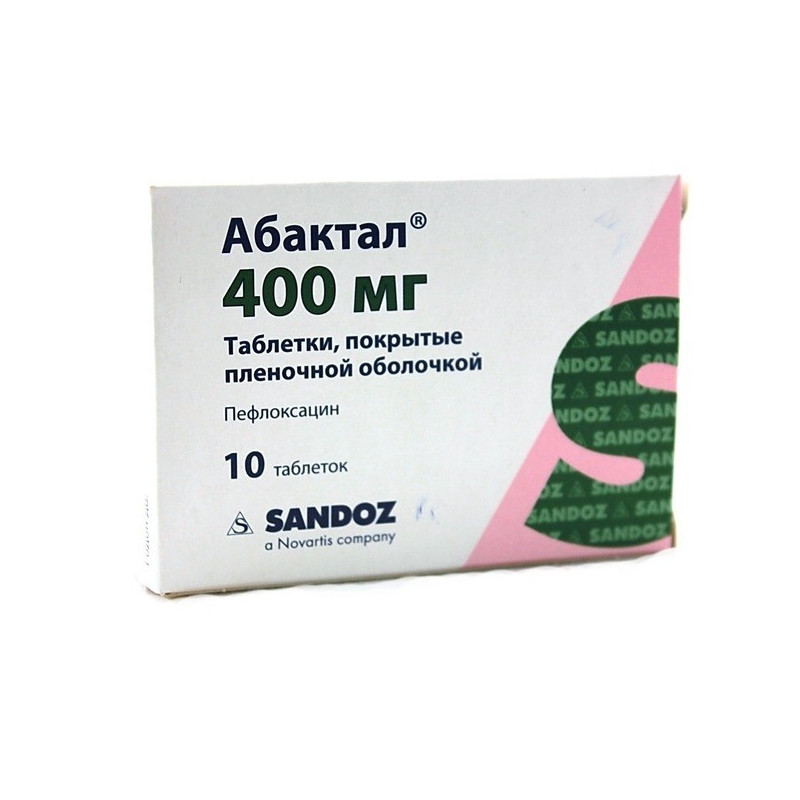



 All payments are encrypted via SSL
All payments are encrypted via SSL
 Full Refund if you haven't received your order
Full Refund if you haven't received your order
Abaktal tablets: 1 tab. contains 400 mg of pefloxacin; 2 and 10 pcs. packaged.
1 ampoule 5ml - 400 mg pefloxacin; 10 pieces. packaged.
- synthetic antimicrobial drug from the group of fluoroquinolones. It has a bactericidal effect, inhibiting bacterial DNA replication at the level of DNA gyrase, also has an effect on RNA and synthesis of bacteria proteins.
Effective against gram-negative bacteria, which are both in the division stage (growth phase) and in the resting stage. With respect to gram-positive strains, it acts only on cells that are in the process of mitotic division. It is active against intracellular pathogens.
Abaktal active against gram-positive bacteria: Staphylococcus aureus, Staphylococcus epidermidis, Staphylococcus saprophyticus; Gram-negative bacteria: Escherichia coli, Klebsiella spp., Enterobacter spp., Serratia spp., Proteus mirabilis, Proteus vulgaris, Сitrobacter spp., Salmonella spp., Shigella spp., Haemophilus ducreyi, Haemophilus influenzae, Neisseria gorcr, auschrophyses, Haemophilus ducreyi, Haemophilus influenzae, Neisseria gorcry, aphorcans, Haemophilus ducreyi, Haemophilus spp. spp., Legionella spp., Moraxella spp., Morganella spp., Pasteurella spp., Providencia spp., Pseudomonas aeruginosa, Yersinia spp., Ureaplasma urealyticum.
To drug moderately sensitive: Acinetobacter spp., Gardnerella vaginalis, Mycoplasma spp., Chlamydia spp.
To drug weakly sensitive: Streptococcus spp. (including Streptococcus pneumoniae), Enterococcus spp.
Treatment of infectious and inflammatory diseases caused by microorganisms sensitive to the drug:
- infections of the liver and biliary tract;
- sepsis and bacterial endocarditis;
- Staphylococcal meningitis and meningitis caused by gram-negative flora;
- infections of bones and joints;
- infections of the lower respiratory tract;
- infections of the ear, nose and throat;
- urinary tract infections;
- infections of the abdominal cavity;
- infections in gynecology;
- infections of the skin and soft tissues;
- treatment and prevention of surgical infections;
- sexually transmitted diseases.
Adults and children over 15 years usually prescribed in a dose of 800 mg / day (as with oral and parenteral administration). The maximum daily dose - 1.2 g.
In the treatment of urinary tract infections Abaktal is prescribed once in a dose of 400 mg / day.
At other infections appoint 400 mg 2 times / day.
In / in the drug is prescribed as an infusion, for which the contents of one ampoule (400 mg) are dissolved in 250 ml of 5% glucose solution and injected into / into the drip (within 1 h) 2 times / day.
Patients with Liver Diseases single dose for intravenous drip (for 1 h) is 8 mg / kg body weight. The frequency of infusions in patients with jaundice is 1 time per 24 h; in patients with ascites, 1 time per 36 h; in patients with jaundice and ascites - 1 time in 48 h.
To achieve therapeutic concentrations more quickly, the first “shock” dose of 800 mg is allowed.
Due to the equivalence of doses when administered orally and intravenously, the drug can be used to conduct sequential therapy (a course initiated by intravenous infusions is continued by oral administration).
Tablets are recommended to be taken during food.
Gastrointestinal: Gastrointestinal disorders.
From the side of the central nervous system: headache, insomnia.
Musculoskeletal system: myalgia, arthralgia.
Hemic and lymphatic: thrombocytopenia (when using a daily dose of 1.6 g).
Dermatologic: photosensitization.
When using the drug in therapeutic doses, side effects are rare, reversible and do not require discontinuation of treatment.
- deficiency of glucose-6-phosphate dehydrogenase;
- pregnancy;
- lactation (breastfeeding);
- children's age up to 15 years;
- hypersensitivity to fluoroquinolones.
The drug is contraindicated for use during pregnancy and lactation.
AT experimental studies The toxic effect of monofluoroquinolones on cartilage tissue has been established.
With caution, the drug is prescribed to patients with diseases of the nervous system (as the risk of developing neurological symptoms increases).
In severe liver diseases, individual dose selection is required depending on the degree of liver dysfunction.
Due to possible photosensitivity during treatment with Abactal, UV radiation should be avoided.
Perhaps the combined use of Abaktal with beta-lactam antibiotics and rifampicin in order to prevent the development of bacterial resistance to the latter.
With the simultaneous use of Abaktal and aminoglycosides, synergism is observed with regard to the pseudomonas aeruginosa, which makes it possible to reduce the dose of aminoglycosides and reduce the risk of developing oto-and nephrotoxic action.
Pefloxacin may potentiate the effects of indirect anticoagulants.
Pharmacokinetic interaction
The absorption of pefloxacin is slowed down while being taken with antacids containing aluminum hydroxide and Magnesium hydroxide.
The simultaneous use of pefloxacin and cimetidine leads to a decrease in total clearance and an increase in the half-life of pefloxacin.
Pefloxacin inhibits microsomal oxidation in the liver cells, affecting the cytochrome P system450. Therefore, Abaktal inhibits theophylline metabolism in the liver, which leads to an increase in plasma theophylline concentration.
Pharmaceutical Interaction
Pefloxacin should not be mixed with solutions containing chlorine ions, in order to avoid precipitation.
The drug should be stored in a dry, dark place at a temperature not higher than 25 ° C.
